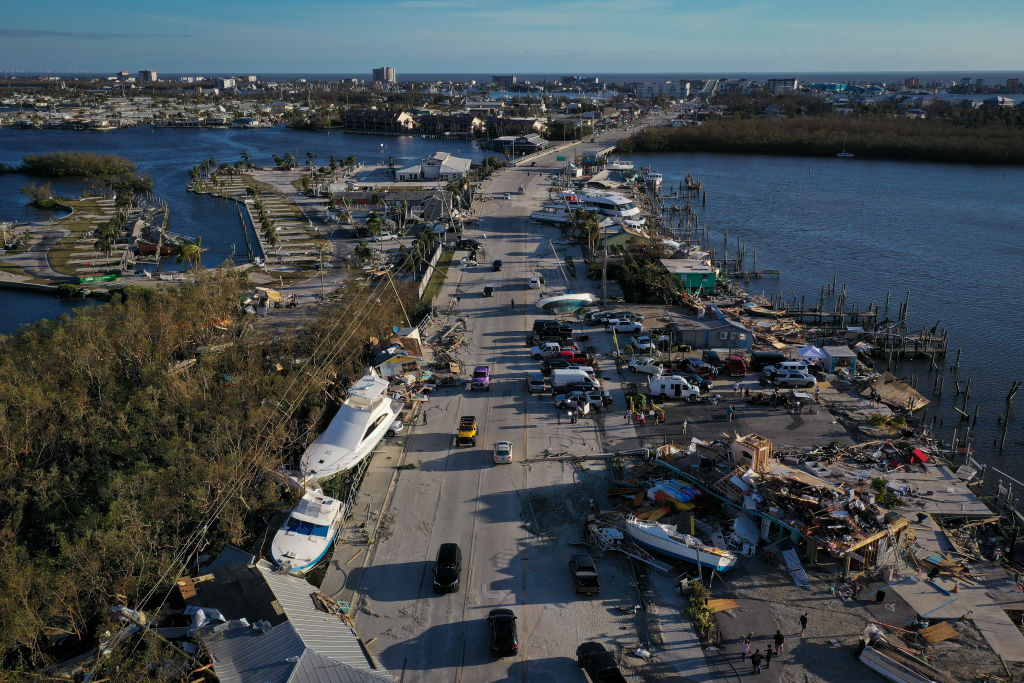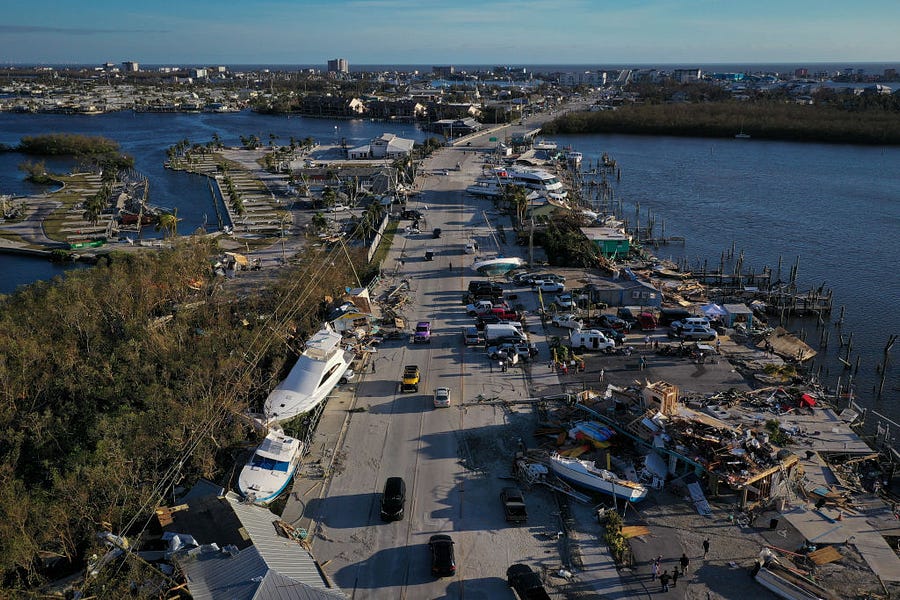Happy Friday! Pour one out for—we swear this is his real name—Frankie Lasagna, the restaurateur and Toronto Blue Jays fan who on Wednesday night was inches away from catching Aaron Judge’s historic 61st home run of the season. The ball would have been worth hundreds of thousands of dollars.
“I would never ever bring a glove [to the game] other than this situation,” Lasagna said. “I needed a bigger one.”
Quick Hits: Today’s Top Stories
-
Hurricane Ian weakened to a tropical storm on Thursday as it dumped rain across the Florida peninsula, but began intensifying again over the Atlantic Ocean and is expected to make landfall near Charleston, South Carolina, as a Category 1 hurricane this morning or early afternoon. More than 2.1 million homes in Florida were without power Friday morning, and the storm’s official death count stands at 12—but it’s expected to rise well beyond that. President Joe Biden suggested yesterday his team was hearing early reports of “substantial” loss of life that could make Ian the “deadliest hurricane in Florida’s history,” while Gov. Ron DeSantis described the storm as “basically a 500-year flood event” that “changed the character of our state.” The National Hurricane Center warned residents of Florida, Georgia, North and South Carolina, and Virginia they could see effects of the storm this weekend, and Biden on Thursday approved emergency declarations for South Carolina and Florida.
-
The Department of Education announced Thursday it was scaling back the scope of President Biden’s student loan cancellation plan, now excluding borrowers with federal student loans held by private entities—including Federal Family Education Loans or Federal Perkins Loan Program loans—from accessing the debt forgiveness. The tweak is expected to affect millions of borrowers otherwise eligible for the program, and is almost assuredly an effort to head off mounting legal challenges. U.S. District Court Judge Richard Young on Thursday denied a request from the Pacific Legal Foundation for a temporary injunction blocking Biden’s proposal, but the PLF made clear it will file an amended complaint. Republican attorneys general in six states—Nebraska, Missouri, Arkansas, Iowa, Kansas, and South Carolina—also filed a lawsuit seeking to block Biden’s action from going into effect.
-
U.S. District Court Judge Aileen Cannon issued an order last night extending the deadline for the outside review of documents seized from Mar-a-Lago in August to be completed, giving Judge Raymond Dearie—the special master appointed to the case—an extra two weeks, until December 16. The Justice Department had hoped for a more expedited process. Cannon—nominated by Trump in the final year of his term—also sided with the former president by rejecting Dearie’s plan to require Trump and his legal team to formally declare whether they believe the FBI agents who executed last month’s search warrant misrepresented the documents they found.
-
Iran’s Islamic Revolutionary Guard Corps launched another series of drone and ballistic missile strikes in northern Iraq on Wednesday—the third in less than a week—targeting Kurdish separatists in purported response to their material and moral support for the mass protests raging inside Iran. The Kurdistan Regional Government said at least 13 people were killed in the attacks—including a pregnant woman and a U.S. citizen—and another 58 were injured. U.S. Central Command reported Wednesday U.S. forces in Iraq downed an Iranian Mojer-6 drone because it “appeared as a threat to CENTCOM forces in the area.”
-
The Senate voted 72-25 on Thursday to advance a continuing resolution that would fund the federal government through December 16 and, if the House passes the legislation today as expected, avert a shutdown that was slated to take effect this weekend. The short-term spending bill—which gives negotiators more time to hammer out a full budget for FY 2023—includes more than $12 billion in additional military and economic aid to Ukraine, $2 billion for disaster relief, $20 million to address the water crisis in Jackson, Mississippi, and more.
-
South Korean and Japanese defense officials said yesterday that North Korea launched yet another ballistic missile into the sea on Thursday—its third such test this week—amid Vice President Kamala Harris’ visit to the region to attend former Japanese Prime Minister Shinzo Abe’s funeral.
-
Freddie Mac reported Thursday the average rate on a 30-year, fixed-rate mortgage reached 6.7 percent this week—the highest in 15 years—up from 6.3 percent last week and 3.01 percent this time last year.
-
The Labor Department reported Thursday that initial jobless claims—a proxy for layoffs—decreased by 16,000 week-over-week to a seasonally adjusted 193,000 last week, the lowest level since late April. With one exception, the figure has now fallen every week since early August, signaling the labor market remains tight.
-
The average number of daily confirmed COVID-19 cases in the United States declined about 23 percent over the past two weeks according to the CDC, while the average number of daily deaths attributed to the virus—a lagging indicator—fell 16 percent. About 22,500 people are currently hospitalized with COVID-19 in the U.S., down from approximately 27,300 two weeks ago.
Former Florida Gov. Jeb Bush on Hurricane Ian Recovery

With Hurricane Ian now somewhere over the Atlantic Ocean and heading up the coast toward South Carolina, Florida is entering the next phase of the crisis: recovery. “From the wee hours of the morning there have been people that have descended on southwest Florida to be able to offer assistance,” Gov. Ron DeSantis said Thursday, urging Floridians who had evacuated not to rush home as crews continue work to restore power and clear roads. “This is going to be a 24/7 operation because we realize how important it is.”
Few understand what DeSantis is going through right now better than Jeb Bush, who earned the nickname “Hurricane Governor” by shepherding the Sunshine State through a whopping nine of the storms—eight of them in a 14-month span. “His popularity with Floridians is probably tethered to those moments probably more than any policy,” Dan Gelber—a former Democratic Miami Beach state senator—told the Tampa Bay Times during Bush’s ill-fated presidential run.
The former governor is safe and sound in Miami as Ian drifts northward, and The Dispatch caught up with him yesterday to discuss DeSantis’ handling of the situation, lessons he learned over the years, and governing in a crisis. The conversation has been edited for length and clarity.
TMD: You’ve obviously dealt with your fair share of these. What are the roles and responsibilities of a governor the day of a hurricane, the day after a hurricane? What was taking up most of your time?
Jeb Bush: I’m guessing the day before yesterday and yesterday, he was on the phone. Seeing his press conferences, he refers to all the conversations he had with all the players in a hurricane: power companies, mayors, commissioners, emergency operations center folks, the director of FEMA, President Biden. He was at the Emergency Operations Center, which was built with proceeds from the federal government and their funding. When you have a big storm, there’s a sliver of dough that comes to be able to focus on remediation, things like shelters. They built an Emergency Operations Center after Hurricane Andrew up in Tallahassee. It’s first-class.
He has something like 25 different subgroups, and he was there coordinating the response at the state level, and doing this in coordination with local government. We do this really well. He’s blessed with a great team. And local responders, by and large, are run with real professionals. Everybody is proud of the effort here.
TMD: What do you make of Gov. DeSantis’ leadership through the storm? Has he been making the right decisions so far?
Bush: When you’re preparing for a storm and the immediate aftermath of a storm, there’s not a lot of variety of choices. … When the winds died down, I wanted to be on the ground, talking to the first responders. I think DeSantis has done that on two or three different stops today. He’s done all the right things, just encouraging and staying connected with people. These press conferences he has, he’s got total command. The guy’s into the details, which is helpful.
The choices that he’ll have will happen later on, when you start trying to figure out: How do you shelter people who have lost their homes? When you lose power for a long period of time you get emergency food stamps, because you lost all your food, how do you set that up? Do you create distribution centers to get water and other things? Maybe now, our private sector distribution is so much better than it was when I was governor that you could probably rely on Walmart, Publix.
He’s doing all the right things. He’s working hard. It will help him politically to show that he cares about the people he’s serving. Even if it wasn’t a popular thing to do, it’s the right thing to do. And he’s doing it really well.
TMD: We’ve seen a lot made about DeSantis’ relationship with Biden leading up to this storm, and now during this storm. As a governor in this sort of crisis, do you want the federal government to be coming in and taking charge? Or should their role be to support what the state is already doing?
Bush: If you look back at previous storms, Louisiana and Katrina being the best example, they just weren’t ready. They didn’t have any training, they didn’t have any resources. New Orleans was corrupt. The state of Louisiana wasn’t ready to do anything, they didn’t ask for support, and it created massive chaos. And then the federal government felt compelled to basically nationalize the response. The army came in, all that stuff.
At that time, I told the head of NORTHCOM, “Sir, with all due respect, we’re grateful for all the help you can bring: Helicopters, reconnaissance, now you’ve got all this drone technology that could be brought to bear in a very cost effective way. We’ll take all the help we can get, but don’t come in and tell us how to do this. We’re Florida.” I was as respectful as I could be, but after Katrina, you know, we had five or six more storms. There was a tendency for the federal government to feel compelled to get involved. And I think Governor DeSantis has got the exact same mindset, “get out of my kitty litter, man.”
FEMA is a tiny little organization. There’s an idea that they have 100,000 people ready to come storm the state or something. It’s just not the case. They’ve got 2,000 people. They basically go to other federal agencies to get tangible support. And then they have a very bureaucratic but important role to play, which is to get reimbursed for all the trash removal, all the infrastructure rebuilding, determining what the match will be, all that stuff. They play an important role there, so you don’t want to like, diss them. But that’s not their job.
The press sometimes—almost all the time—feels compelled to create this sense that it’s the federal government’s role. We’re a bottom-up country. The mayor, the chairman of the county commission of Lee County is going to care a lot more about Fort Myers Beach, and he’s going to coordinate all this with Governor DeSantis, and he’s gonna seek out help, and the governor will give it to him, whether he’s a Democrat or a Republican.
TMD: You were the governor during nearly 10 hurricanes. What lessons had you learned by the end of your tenure that you wish you had known at the beginning?
Bush: Great question. How to get the utilities. If you look at Florida Power & Light today, they do a phenomenal job, it’s unbelievable how good they are. They weren’t that good in the first storms. They were doing their best, but they weren’t transparent.
If you’re out of power for three weeks, you get scared, you get frustrated, you get angry. And there wasn’t the kind of communication that now exists, where you can go online and find out the estimate of when your city is going to be wired up. So pushing the utility companies to be more transparent was a learning experience, prioritizing the electrification of the state. So, evacuation, major thoroughfares, big commercial streets like in Miami would be wired up first. Because that’s where you get to schools, that’s how you get to the daycares, that’s how you get to the hospitals. And then wiring up these critical infrastructure, that makes the recovery. In the beginning, I don’t think we fully appreciated that. So we got really good at that.
Here Comes Commercial COVID Care
If you’re planning to go in for one of the new variant-specific COVID boosters this fall, make sure you savor the experience. It could be the last piece of pandemic care you get on Uncle Sam’s dime.
The federal government has put hundreds of billions of dollars toward emergency health spending since the initial COVID outbreak, incentivizing the rapid development of tests, vaccines, and treatments, then ensuring that Americans could access them for free. Now, with the U.S. well into the disease’s endemic phase, the Biden administration is moving to integrate COVID care with the rest of the commercial health care industry.
Such an integration was always going to happen eventually. “One of the things we’ve spent a lot of time thinking about in the last many months … is getting out of that acute emergency phase where the U.S. government is buying the vaccines, buying the treatments, buying the diagnostic tests,” White House COVID-19 Response Coordinator Dr. Ashish Jha said at a Chamber of Commerce event last month. “My hope is that in 2023, you’re going to see the commercialization of almost all of these products.”
But for much of this year, the Biden administration hoped to postpone the transition a little longer—several times asking Congress to replenish pandemic response funds in spending legislation. The White House spent this month urging leaders to allocate another $22.4 billion for “short-term domestic needs,” arguing many of its COVID funding programs were running on fumes.
“In March, we requested that Congress provide supplemental COVID-19 funding and repeatedly warned that without congressional action, we would be forced to make difficult trade-offs and pull existing funding from critical efforts to meet the most pressing needs,” Office of Management and Budget Director Shalanda Young wrote earlier this month. “This is precisely what has happened.”
The spending deal congressional leaders struck this week didn’t include those requested funds, however, meaning that transition is likely coming sooner rather than later.
In fact, some elements of the change have already been happening for months. The government is no longer buying new supply of monoclonal antibodies, expensive therapeutics that were among the first major breakthroughs for COVID treatment.
There have been logistical hiccups, too. For instance, while the administration’s COVID vaccine distribution program still has plenty of supply on hand, the fund designated to reimburse doctors and pharmacists for associated administrative costs ran dry in March. In order to keep the vaccine free at point of care, the administration threatened vaccine administrators with an ultimatum: Keep giving the vaccine—even to the uninsured—without charging for your time, or risk losing access to the distribution program altogether.
This arrangement has led to protests from industry groups. “The government has continued to pay for other things, continued to buy more vaccine, et cetera, but they have hung the providers out to dry when it comes to the uninsured patients,” Kurt Proctor, senior vice president of strategic initiatives at the National Community Pharmacists Association, told The Dispatch. “Our members in independent community pharmacy, they’re about taking care of their community … and for the federal government or anybody else to take advantage of that leaves a bad taste in my mouth.”
Difficulties like this illustrate why many public health experts share a common fear: No matter how smoothly the transition goes, the disappearance of a federal financial backstop for testing, vaccination, and treatment risks hurting ongoing efforts to make sure people can get the care they need.
“What happens next in terms of this transition to commercialization, what its implications are for Americans’ ability to afford these lifesaving treatments and preventative strategies, is not yet determined,” Dr. Megan Ranney, an emergency physician and professor at Brown University, told The Dispatch.
“There is a best-case scenario, in which insurance companies and Medicare continue to provide these treatments at cost, or consider them to be the equivalent of preventive care or preferred pharmaceuticals, which have minimal copays and minimal deductibles,” Ranney went on. “That would increase equity of access, increase the likelihood of people being able to access these treatments, and would be a huge boon for public health. Or there’s another, scarier reality, in which these become the highest formulary tier of drugs, because they’re relatively new, where the consumer’s got a $150 or $300 deductible every time they want to access a monoclonal antibody or Evushield or [antiviral pill] Paxlovid.”
Worth Your Time
-
Hiking interest rates is going to boost unemployment—possibly significantly—but the alternative is worse, Ramesh Ponnuru argues in his latest Bloomberg column. “What makes the question difficult is that the costs of inflation, while serious, are diffuse, while the costs associated with unemployment are highly concentrated,” he writes. “The costs of being unemployed are personal and often severe. They can include broken families, compromised mental health and reduced long-term prospects. At the same time, the human toll of unemployment can’t be the argument-ender that [U.S. Senator Elizabeth] Warren and like-minded observers want it to be. If it were, that would mean that tighter policy is never justified. That can’t be right.”
-
On September 17, Maggie Mertens published an essay in The Atlantic arguing that separating sports by sex doesn’t make sense. On September 29, Steve Magness published an essay in The Atlantic arguing that it does. “Sport for women is generally undervalued and under-resourced in America, and this can affect women’s performance levels,” Magness writes. “Coed sports at recreational and youth standards—played as part of living a good life, not to develop elite athletes—can be both fun and competitive. But at the highest, rarefied levels of many professional sports, men and women appear to have different performance ceilings.” Given that reality, a gender-neutral playing field wouldn’t necessarily be the most equitable. “None of this is meant to disparage the phenomenal women athletes at the top of their game,” Magness continues. “But if we stopped dividing sport by sex, elite women’s sport as we know it could cease to exist.”
Presented Without Comment
Also Presented Without Comment
Also Also Presented Without Comment
Toeing the Company Line
-
Richard Reeves of the Brookings Institution joined Jonah on The Remnant this week to discuss his new book about why men are struggling in today’s world. In a moment where the family unit is collapsing, gender differences in education are becoming more pronounced, and large numbers of men are withdrawing entirely from the workforce, it’s vital to explore what’s driving these trends—and whether they can be reversed.
-
Thursday’s episode of The Dispatch Podcast featured a conversation between Sarah, AEI senior fellow John Fortier, and Stanford Constitutional Law Center fellow Matthew Seligman on all things Electoral Count Act. Why does the law exist, and why is Congress currently trying to reform it? Are the differences between the competing House and Senate versions meaningful? Would either bill prevent a constitutional crisis in 2024?
-
And on today’s episode of The Dispatch Podcast, Sarah, David, and Jonah examine all the Nord Stream conspiracy theories, take a look at the biggest spenders in the midterms, and discuss the qualities that make a good leader (or at least a good politician) during natural disasters.
-
If it’s Thursday, that means it’s time for a tech news roundup from Klon. In yesterday’s edition of The Current (🔒), he touches on the Twitter whistleblower’s testimony, the likelihood of TikTok reaching a deal with the United States to address national security concerns (slim), Russia’s surveillance apparatus, a mystery drone in Crimea, and more.
-
Will President Biden’s slightly improved approval rating help Democrats all that much in the midterms? “Biden has succeeded in turning these midterms into a choice between him and Trump,” Chris writes in this week’s Stirewaltisms (🔒). “Unfortunately for the party in power, the current president is only slightly more popular than the twice-impeached, aspiring authoritarian who preceded him.”
-
On the site today, Nick Catoggio demonstrates the value-add of pulling a career blogger into The Dispatch fold in a level-headed breakdown of the latest internet controversy: Lizzo’s playing of James Madison’s 200-year-old flute.
Let Us Know
Are you surprised at the bipartisan, collaborative response to Hurricane Ian? Is there any reason to be optimistic that this pause in polarization will last longer than the rain?







Please note that we at The Dispatch hold ourselves, our work, and our commenters to a higher standard than other places on the internet. We welcome comments that foster genuine debate or discussion—including comments critical of us or our work—but responses that include ad hominem attacks on fellow Dispatch members or are intended to stoke fear and anger may be moderated.
With your membership, you only have the ability to comment on The Morning Dispatch articles. Consider upgrading to join the conversation everywhere.